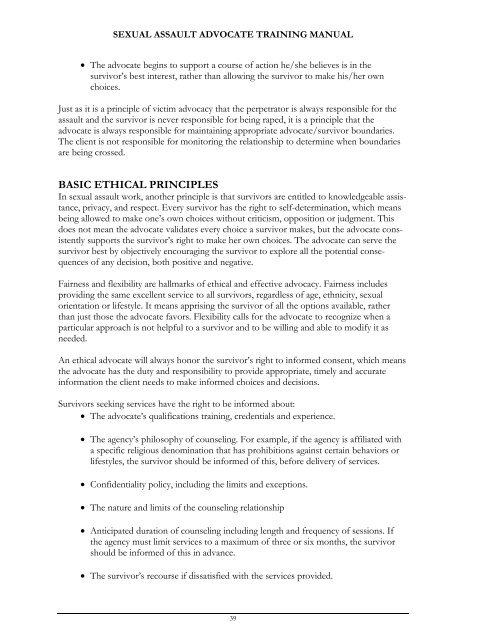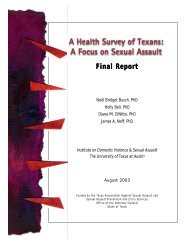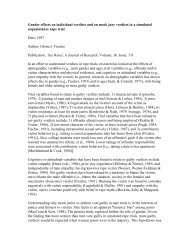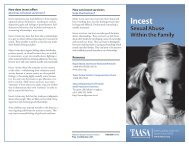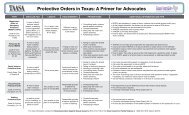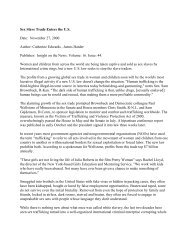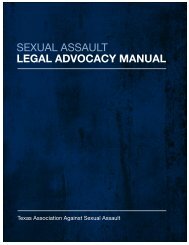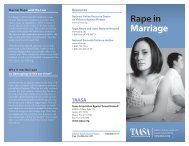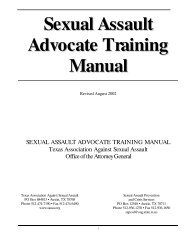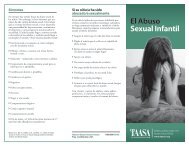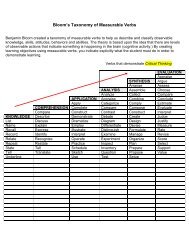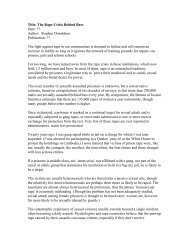Sexual Assault Advocate Training Manual - Texas Association ...
Sexual Assault Advocate Training Manual - Texas Association ...
Sexual Assault Advocate Training Manual - Texas Association ...
You also want an ePaper? Increase the reach of your titles
YUMPU automatically turns print PDFs into web optimized ePapers that Google loves.
SEXUAL ASSAULT ADVOCATE TRAINING MANUAL<br />
• The advocate begins to support a course of action he/she believes is in the<br />
survivor’s best interest, rather than allowing the survivor to make his/her own<br />
choices.<br />
Just as it is a principle of victim advocacy that the perpetrator is always responsible for the<br />
assault and the survivor is never responsible for being raped, it is a principle that the<br />
advocate is always responsible for maintaining appropriate advocate/survivor boundaries.<br />
The client is not responsible for monitoring the relationship to determine when boundaries<br />
are being crossed.<br />
BASIC ETHICAL PRINCIPLES<br />
In sexual assault work, another principle is that survivors are entitled to knowledgeable assistance,<br />
privacy, and respect. Every survivor has the right to self-determination, which means<br />
being allowed to make one’s own choices without criticism, opposition or judgment. This<br />
does not mean the advocate validates every choice a survivor makes, but the advocate consistently<br />
supports the survivor’s right to make her own choices. The advocate can serve the<br />
survivor best by objectively encouraging the survivor to explore all the potential consequences<br />
of any decision, both positive and negative.<br />
Fairness and flexibility are hallmarks of ethical and effective advocacy. Fairness includes<br />
providing the same excellent service to all survivors, regardless of age, ethnicity, sexual<br />
orientation or lifestyle. It means apprising the survivor of all the options available, rather<br />
than just those the advocate favors. Flexibility calls for the advocate to recognize when a<br />
particular approach is not helpful to a survivor and to be willing and able to modify it as<br />
needed.<br />
An ethical advocate will always honor the survivor’s right to informed consent, which means<br />
the advocate has the duty and responsibility to provide appropriate, timely and accurate<br />
information the client needs to make informed choices and decisions.<br />
Survivors seeking services have the right to be informed about:<br />
• The advocate’s qualifications training, credentials and experience.<br />
• The agency’s philosophy of counseling. For example, if the agency is affiliated with<br />
a specific religious denomination that has prohibitions against certain behaviors or<br />
lifestyles, the survivor should be informed of this, before delivery of services.<br />
• Confidentiality policy, including the limits and exceptions.<br />
• The nature and limits of the counseling relationship<br />
• Anticipated duration of counseling including length and frequency of sessions. If<br />
the agency must limit services to a maximum of three or six months, the survivor<br />
should be informed of this in advance.<br />
• The survivor’s recourse if dissatisfied with the services provided.<br />
39


